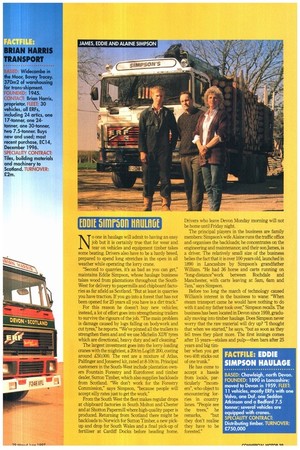N o one in haulage will admit to having an easy
Page 41

If you've noticed an error in this article please click here to report it so we can fix it.
job but it is certainly true that for wear and tear on vehicles and equipment timber takes some beating. Drivers also have to be a hardy breed, prepared to spend long stretches in the open in all weather while operating the lorry crane.
"Second to quarries, it's as bad as you can get," maintains Eddie Simpson, whose haulage business takes wood from plantations throughout the SouthWest for delivery to papermills and chipboard factories as far afield as Scotland. "But at least in quarries you have traction. If you go into a forest that has not been opened for 25 years all you have is a dirt track."
• For this reason he doesn't buy new vehicles; instead, a lot of effort goes into strengthening trailers to survive the rigours of the job. "The main problem is damage caused by logs falling on bodywork and cut tyres," he reports, "We've pinned all the trailers to strengthen them and and we use Michelin KM' tyres which are directional, heavy duty and self cleaning."
The largest investment goes into the lorry-loading cranes with the mightiest, a 20t/m Loglift 200, costing around £50,000. The rest are a mixture of Atlas, Palfinger and Jonsered kit, rated at Maim. Principal customers in the South-West include plantation owners Fountain Forestry and Euroforest and timber dealer, Sutton Timber, which also supplies backloads from Scotland. We don't work for the Forestry Commission," says Simpson, "because people will accept silly rates just to get the work."
From the South West the fleet makes regular drops at chipboard factories in South Molton and Chester and at Shotton Papermill where high-quality paper is produced. Returning from Scotland there might be backloads to Norwich for Sutton Timber, a new pickup and drop for South Wales and a final pick-up of fertiliser at Cardiff Docks before heading home. Drivers who leave Devon Monday morning will not be home until Friday night.
The principal players in the business are family members: Simpson's wife Alaine runs the traffic office and organises the backloads; he concentrates on the engineering and maintenance; and their son James, is a driver. The relatively small size of the business belies the fact that it is over 100 years old, launched in 1890 in Lancashire by Simpson's grandfather William. "He had 36 horse and carts running on "long-distance"work between Rochdale and Manchester, with carts leaving at 5am, Gam and 7am," says Simpson.
Before too long the march of technology caused William's interest in the business to wane: "When steam transport came he would have nothing to do with it and my father took over," Simpson recalls. The business has been located in Devon since 1959, gradually moving into timber haulage. Does Simpson never worry that the raw material will dry up? "I thought that when we started," he says, 'but as soon as they fell trees they plant more. The first innings comes after 15 years—stakes and pulp—then bars after 25 years and big timber when you get two 40ft sticks out of one trunk."
He has come to accept a hassle from locals, particularly "incomers", who object to encountering lorries in country lanes. "People see the trees," he remarks, "but they don't realise they have to be forested."












































































































